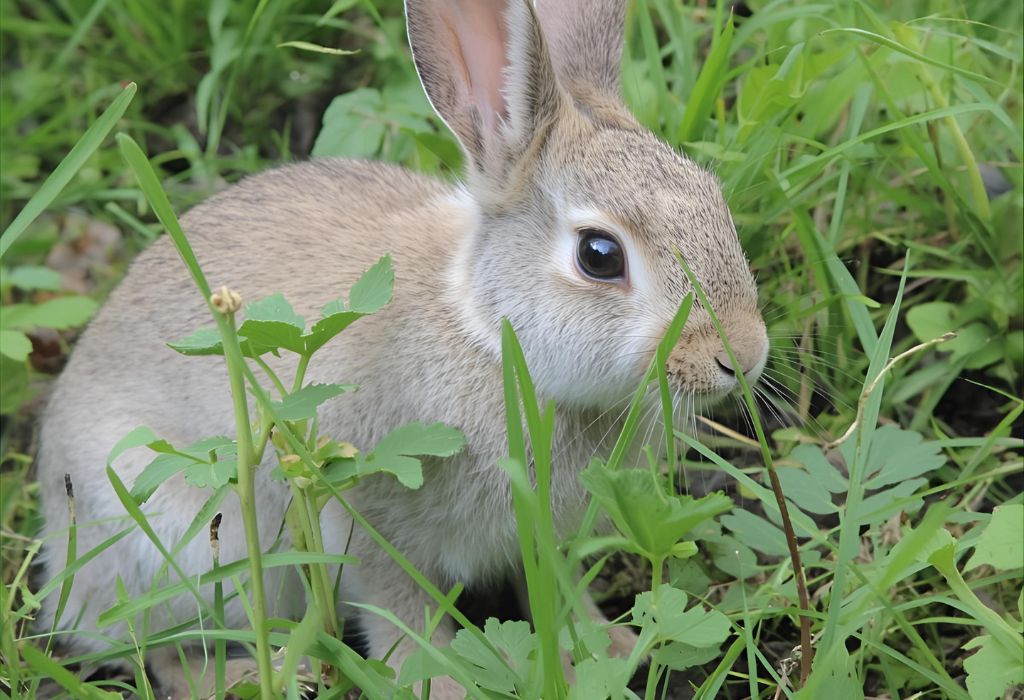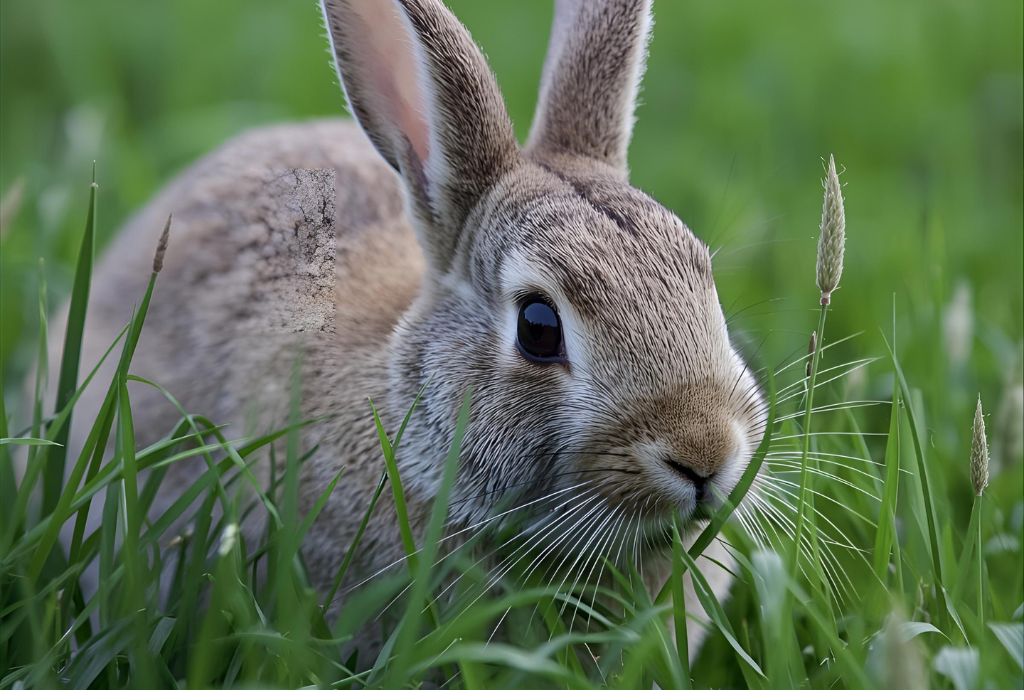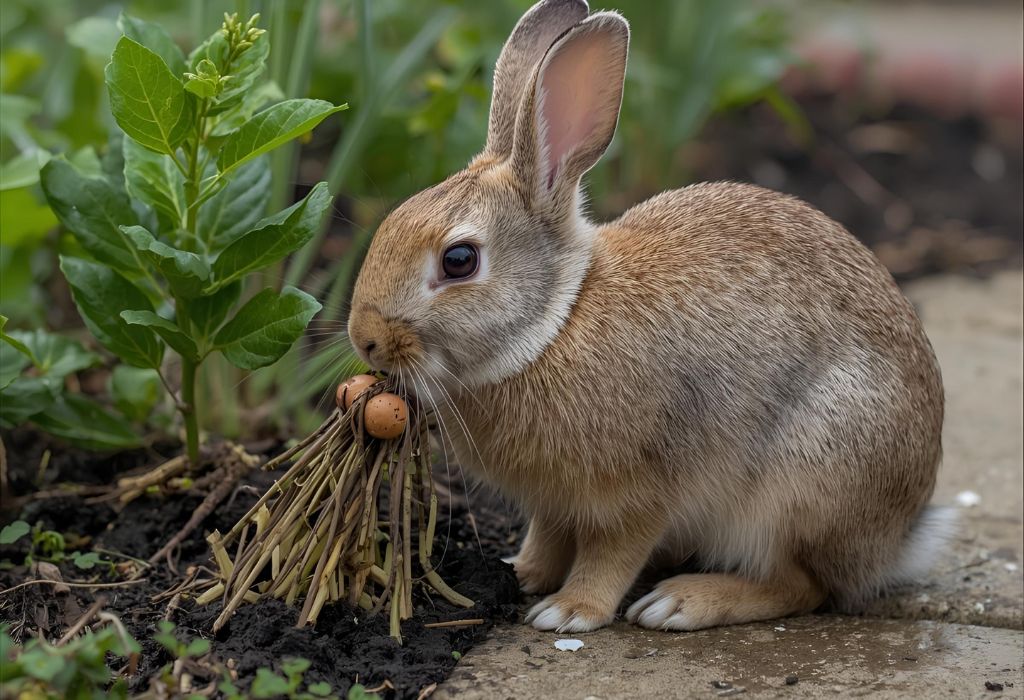Watching a rabbit nibble away at fresh greens in the garden can seem like the perfect picture of natural harmony. Yet hidden among those greens may be weeds that are either packed with nutrition or dangerously toxic.
This raises the question: can rabbits eat garden weeds without any risks? The answer lies in careful identification, balanced nutrition, and an understanding of which plants help rabbits thrive and which can cause harm.
Rabbits are natural foragers. In the wild, they rely on a variety of wild herbs, grasses, and weeds to meet their nutritional needs. Research shows that wild greens often contain higher levels of vitamins A, C, and K, along with calcium and fiber, compared to many store-bought vegetables (Westley’s World).
At the same time, some garden weeds are known to be toxic. Buttercups, ragwort, and groundsel, for example, contain compounds that can irritate or poison rabbits if consumed in significant amounts (Rabbit Rehome Forum).
What Makes Garden Weeds Safe or Risky?

Not all weeds are created equal. Some are highly nutritious and safe for rabbits, while others carry toxins that threaten health.
Safe weeds such as dandelion, chickweed, clover, plantain, and sow thistle are rich in fiber and vitamins. These are often listed as “rabbit-safe weeds” by animal welfare groups and are even used in small amounts by rabbit rescues.
On the other hand, toxic weeds like buttercups (Ranunculus), ragwort, and foxglove contain harmful chemicals. Eating these plants can lead to digestive upset, liver damage, or worse.
The biggest challenge is misidentification. Many weeds look similar, and confusing a safe weed with a poisonous one can have serious consequences. Plant identification apps can help but are not always reliable, making trusted guides and expert confirmation essential.
Another factor is the source of the weed. Even safe plants can become harmful if they have been sprayed with pesticides, contaminated by road pollution, or exposed to animal waste.
In short, the safety of a weed depends on three factors: its species, its growing environment, and how accurately it has been identified.
Nutritional Benefits of Rabbits Eating Garden Weeds

Rabbits benefit greatly from a diet rich in fiber, and many garden weeds naturally provide it. Fiber keeps the digestive system functioning properly and helps prevent gastrointestinal stasis, a potentially fatal condition.
Dandelions, one of the most common rabbit-safe weeds, are packed with vitamins A and C, along with minerals like calcium and potassium. These nutrients support bone strength, immune function, and hydration.
Chickweed and plantain contribute antioxidants that aid in cell protection. Clover provides protein that helps maintain muscle mass, though it should be fed in moderation to avoid excess calcium.
Weeds are also highly hydrating. Many have a high water content, which can supplement a rabbit’s fluid intake and reduce the risk of dehydration during warm months.
Foraging for weeds provides more than just nutrition. It stimulates natural behaviors, offering mental enrichment and encouraging activity. This kind of engagement is essential for a rabbit’s overall well-being.
By rotating different safe weeds, rabbits receive a wide variety of nutrients while avoiding the risks of dietary imbalance. This diversity mirrors their wild foraging habits and helps maintain long-term health.
Practical Foraging Tips for Garden Weeds
Foraging is rewarding, but it requires responsibility. Garden weeds should only be collected from areas free of pesticides, herbicides, and traffic pollution.
The best places to forage are clean lawns, organic gardens, or wild areas away from roads. Avoid weeds from unknown or contaminated sites, as these may carry harmful residues.
Before offering weeds to rabbits, ensure they are washed thoroughly. This helps remove dirt, insects, and potential contaminants.
Weeds should always be introduced gradually into the diet. Sudden dietary changes can upset a rabbit’s sensitive digestive system, even with safe plants.
Foraging also helps redirect rabbits from damaging vegetable patches. Creating a “weed buffet” of clover or dandelion can keep them busy and less interested in tender crops.
It’s also important to balance weeds with hay. While weeds are beneficial, hay remains the foundation of a rabbit’s diet and should make up the majority of daily intake.
Foraging is both practical and enriching. Done correctly, it supports nutrition, encourages natural behavior, and strengthens the bond between rabbits and their environment.
Strategies for Gardeners with Rabbits and Weeds
When rabbits share space with a vegetable garden, weeds can play a surprising role in keeping peace. Safe weeds can be used as a distraction, satisfying rabbits while protecting prized vegetables.
One strategy is to grow safe weeds intentionally in a separate patch. This designated area offers rabbits something to forage without risking damage to crops.
Raised beds can also help. By planting vegetables above ground level, rabbits are less likely to access them, while ground-level weed patches keep them occupied.
Some plants naturally repel rabbits. Strong-smelling herbs such as rosemary, mint, or garlic tend to discourage nibbling, allowing gardeners to focus on growing sensitive crops in peace.
For more active deterrence, humane options like motion-activated sprinklers or mild natural repellents can be used. These methods discourage unwanted garden grazing without causing harm.
Ultimately, integrating safe weeds into the environment benefits both rabbits and gardeners. Rabbits receive enrichment and nutrition, while vegetables are shielded from overzealous nibbling.
Preventing Risks When Feeding Rabbits Weeds
Even rabbit-safe weeds can pose risks if offered carelessly. The first step is always accurate identification, supported by reliable guides or expert confirmation.
Variety is another safeguard. Feeding too much of one plant, even a safe weed, can create nutritional imbalances or lead to excess calcium intake.
Weeds should never replace the staples of a rabbit’s diet. High-quality hay must remain the primary food, supported by measured amounts of leafy greens, weeds, and pellets.
Safe handling is equally important. Never feed weeds that have been exposed to chemical sprays, car exhaust, or waste from other animals.
Portion size should remain modest. Treat weeds as a supplement that enhances diet variety, not as a main food source.
With these precautions, garden weeds become an asset rather than a risk. Balanced use ensures that rabbits gain nutrition and enrichment without endangering their health.
Alternatives to Feeding Rabbits Garden Weeds

Some owners prefer not to forage, whether due to safety concerns or lack of access to clean areas. In these cases, alternatives provide peace of mind.
Commercially grown herbs like parsley, cilantro, and basil offer many of the same benefits as weeds. They are easy to source, safe, and rich in vitamins.
Specialized rabbit-safe dried forage mixes are another option. These products often contain dandelion leaves, nettle, and plantain, providing variety in a controlled form.
Growing your own rabbit-safe plants can also be rewarding. Pots of clover, dandelion, or even lettuce varieties can be cultivated organically at home.
Store-bought leafy greens add further balance. Romaine lettuce, kale in moderation, and spinach can provide similar nutrition while reducing reliance on wild weeds.
While garden weeds are valuable, these alternatives ensure rabbits never miss out on essential nutrients, even when safe foraging isn’t possible.
Conclusion
So, can rabbits eat garden weeds without any risks? The answer is yes—when safe weeds are chosen, identified properly, and offered responsibly.
Safe weeds such as dandelion, clover, and plantain provide vital nutrients, hydration, and enrichment. They support digestive health and mirror the natural foraging behaviors of wild rabbits.
At the same time, toxic weeds like buttercups and ragwort must always be avoided. Careless identification or contamination can quickly turn a healthy snack into a dangerous one.
The safest approach is variety and moderation. Garden weeds should supplement, not replace, a diet centered on hay, with vegetables and pellets rounding out nutrition.
By learning to identify safe weeds, sourcing them responsibly, and balancing them with other foods, rabbits can enjoy the natural benefits of foraging. Gardeners, too, can find harmony by using weeds as both distraction and enrichment.
In the end, garden weeds are not just nuisances. They are a potential resource that, when managed wisely, contribute to healthier, happier rabbits and more balanced gardens.
I’m Maya L. Greenwood, a lifelong plant lover who believes anyone can grow something beautiful with the right guidance. After years of testing soil mixes, pruning methods, irrigation tricks, and pest-safe solutions, I started EasyGardenTips.com to turn hard-won lessons into step-by-step advice. From seed starting and container gardens to composting and seasonal checklists, my goal is to make gardening simple, sustainable, and fun.
